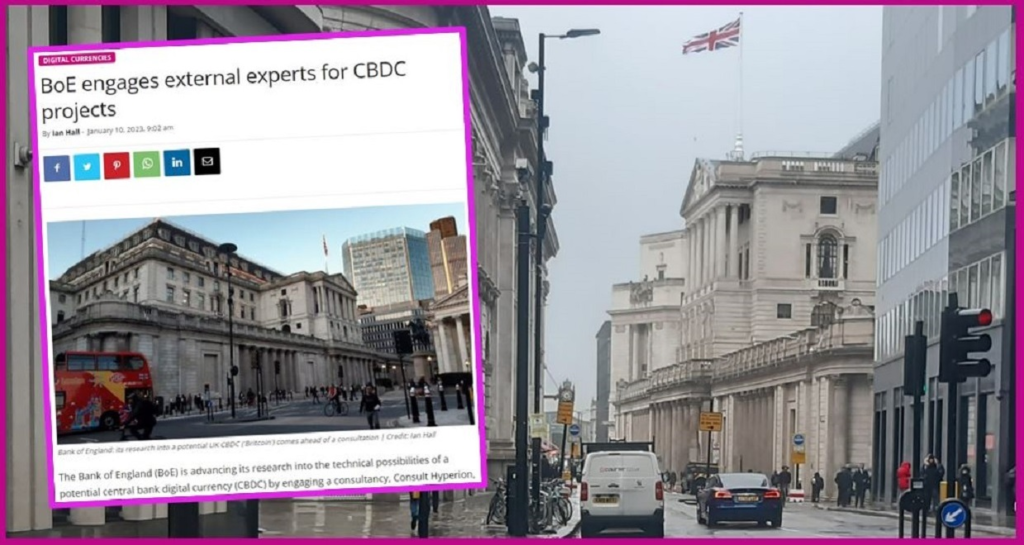Source: Global Government Fintech

The Bank of England (BoE) has inked a contract with a consultancy to develop a central bank digital currency (CBDC) digital wallet proof-of-concept as it looks to ‘make the CBDC product more tangible’.
A decision has yet to be made on whether to introduce a digital pound. But the central bank, like many similar authorities worldwide, is stepping up its investment in exploring the many technical elements of what the BoE has described as – should it proceed – a ‘major national infrastructure project’.
Global Government Fintech reported in December 2022 that a supplier opportunity had been published on the UK government’s ‘Digital Marketplace’, used by public-sector buyers to find technology or people to deliver digitally-focused projects, for a ‘CBDC Sample Wallet Proof of Concept and Research’.
Global Government Fintech can today reveal that a contract with a value of £186,504 (about $237,000) – apparently the most sizeable single contract to date awarded by the BoE for CBDC-related work (see table lower down this article) – has since been inked with London-headquartered Kin + Carta, according to a ‘CBDC Sample Wallet Proof of Concept and Research’ award notice.
The work description is to ‘build a proof-of-concept sample wallet’ under the broader bracket of the provision of ‘software package and information systems’. The contract started in February and ends in July, according to the notice (which was published on 26 April).
UK consultation ongoing
UK authorities are currently running a consultation ahead of the potential decision to issue a digital pound. The BoE and HM Treasury issued a long-awaited ‘Digital pound: a new form of money for households and businesses?’ consultation paper in February, with its overarching message being that a British CBDC is ‘likely to be needed in the future’.
The 116-page consultation paper – whose deadline for responses has recently been extended from 7 June to 30 June – analyses the public policy case for a CBDC, sets out elements of the proposed design and reveals that a ‘design phase’ will run until 2025. A ‘build phase’, including live pilot tests, would begin in 2025 at the earliest. A decision about whether to implement a digital pound is likely to be taken ‘around the middle of the decade’ and will ‘largely be based on future developments in money and payments’. The earliest launch timing, should the lights turn from amber to green, is likely be the latter half of the 2025-2029 period.
The BoE also issued a ‘Digital pound: technology working paper’, which includes 64 mentions of the word ‘wallet’, alongside the consultation paper.
The opportunity notice for the sample wallet assignment pointed out that while the BoE will not develop a user wallet itself, the central bank may develop payment scheme rules and user experience guidelines for private-sector wallet providers, in addition to supporting core CBDC functionality via its ledger and application programming interface (API).
The stated aims of the project for which Kin + Carta have been appointed include (according to the original notice) ‘making the CBDC product more tangible for internal and external stakeholders, for example as a prototype for future user testing’ and ‘exploring the end-to-end user journey as a way to sharpen functional requirements for both the BoE and private sector’.
The notice specified that ‘key deliverables’ are the production of a wallet mobile app (built on android as well as Apple’s mobile operating system iOS); a wallet website; an example merchant website; and back-end server to serve mobile app and website, ‘call’ the core ledger API and store user data and transaction history.
International explorations
The opportunity notice also made reference to ‘Project Rosalind’. This is an initiative being led by the BoE-hosted Bank for International Settlements (BIS) Innovation Hub’s London office that aims to build a prototype of an open API to enable a central bank ledger to interact with private-sector service providers to safely distribute and settle retail CBDC payments. The digital wallet proof-of-concept would, the notice stated, support the BoE’s Project Rosalind work ‘by testing integration of a front-end with the Rosalind API.’
The notice also stated that the project should aim to ‘support future exploration of further functionality that is out of scope here, for example offline payments or KYC [know-your-customer] processes for new users.’ It is also specified that the proof-of-concept will need to have the ability to handle payments ‘via account ID or QR code’ as well as ‘programmatic/API payment (saved address)’.
CBDC teams in monetary authorities outside the UK are also wrestling with the question of digital wallet design.
The European Central Bank (ECB) – which is in the closing months of a two-year ‘investigation phase’ into the possibility of a CBDC for the 20-member eurozone (a digital euro) – on 24 April published the findings of focus groups on people’s views on the features of a potential digital wallet (alongside its third digital euro progress report).
BoE’s CBDC spend on the rise
Kin + Carta joins a growing cast of external providers (mainly companies) to have been appointed by the BoE on CBDC-related assignments.
Global Government Fintech also recently revealed that a contract for a CBDC proof-of-concept and research of offline payments (valued at £100,620) was awarded to Thales UK on 16 December (and ran from 9 January 2023 to 8 May 2023).
A further appointment was a contract valued at £100,000 for ‘targeted analysis of the microeconomics of a CBDC’ awarded to Frontier Economics Ltd (based on High Holborn, London). This contract (published online on 22 May) ran from 19 January to 23 March. It was for the production of a report to include a focus on ‘the economics of potential Payment Interface Provider (PIP) business models.’
Bank of England CBDC external contracts
(Global Government Fintech lists the contracts by value)
*Kin + Carta: £186,504 (‘CBDC sample wallet proof-of-concept and research’; Feb-July 2023)
*Consult Hyperion: £121,825 (point-of-sale proof-of-concept prototype; ran to March 2023)
*Consult Hyperion: £113,650 (e-commerce/CNP transactions feasibility study; ran to March 2023)
*Thales UK: £100,620 (‘CBDC proof-of-concept and research of offline payments; Jan-May 2023)
*Frontier Economics Ltd: £100,000 (‘targeted analysis of the microeconomics of a CBDC’; Jan-Mar 2023)
*MIT Media Lab DCI (USA): £75,000 (research; ran to 31 Jan 2023)
*Consult Hyperion: £48,900 (feasibility study; Feb 2022-Apr 2022)
*Oliver Wyman: £32,000 (research; runs to 1 July 2023)
TOTAL: £778,499
Source: Global Government Fintech research using UK government Contracts Finder website
The BoE’s deadline for responses to its digital pound consultation was extended due to the omission of a question (‘Do you have comments on our proposal that non-UK residents should have access to the digital pound, on the same basis as UK residents?’ – question nine in the consultation paper) from an online response form.
*** The BoE is also bulking up its staffing in regards to CBDC, having begun recruitment processes for the role of ‘head of the digital pound project’ and ‘head of digital currency technology’. The window to apply for both roles runs to 12 June.
























































